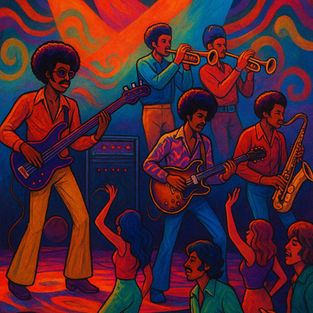
Photo- Fin Costello/ Getty Images
How Aerosmith Defined the Sound of the '70s
In the sprawling and experimental musical landscape of the 1970s, Aerosmith emerged as one of the defining forces of American rock.
12 August 2025
Often referred to as the "Bad Boys from Boston," the band became one of the decade's most recognisable groups thanks to their gritty blues-rock sound, swaggering stage presence, and rebellious spirit. Aerosmith had a talent for fusing genuine emotion with hard rock intensity; thus, they not only followed but also influenced the musical trends of their time.
The Early Days: Grit over Glam.
Aerosmith, founded in 1970, introduced a distinct American flavour to the global rock scene. While British artists such as Led Zeppelin and The Rolling Stones ruled the charts, Aerosmith provided something unique: a rougher, street-level rock 'n' roll steeped in the blues. Their 1973 self-titled debut introduced listeners to Steven Tyler's distinct rasp and Joe Perry's crisp, riff-heavy guitar work—an electric combination that would define the band's sound for decades.
Breaking Through with Raw Power.
By the mid-1970s, records like Get Your Wings (1974) and Toys in the Attic (1975) had propelled Aerosmith into the rock stratosphere. "Sweet Emotion" and "Walk This Way" were more than merely hits; they became cultural classics. The band's ability to incorporate funk-inspired grooves into hard rock riffs made their music appealing to both rock purists and mainstream audiences.
Toys in the Attic demonstrated Aerosmith's talent at combining raw rock with radio-ready hooks. Tyler and Perry's chemistry—later called "The Toxic Twins"—was both the band's greatest strength and a source of internal dysfunction, feeding the rebellious, volatile energy that fans adored.
Style, Attitude, and the 1970s Rock Aesthetic
Aerosmith represented more than just music; they captured the appearance and feel of 1970s rock culture. Tyler's flashy scarves, Perry's leather jackets, and the band's general "devil-may-care" attitude appealed to a generation that valued freedom, self-expression, and extravagance. Their shows were loud, sweaty, and unabashedly wild, perfectly capturing the decade's larger-than-life energy.
Cultural Impact and Longevity
What distinguished Aerosmith from their contemporaries was their ability to grow while remaining faithful to their roots. By the late 1970s, with albums like Rocks (1976) and Draw the Line (1977), they had solidified their position as kings of hard rock. Even as personal troubles and substance misuse took their toll, the band's impact remained undeniable. Their work in the 1970s created the groundwork for their rebirth in the 1980s and 1990s, influencing subsequent generations of rock artists. Modern groups continue to draw on Aerosmith's blend of blues grit, rock force, and theatrics, demonstrating that the sound they pioneered in the 1970s is still relevant today.
Legacy of a Decade
Aerosmith holds a unique position in the pantheon of 1970s rock. They encapsulated the decade's vitality, revolt, and musical invention while remaining firmly grounded in classic American blues roots. For many, Aerosmith were more than simply the soundtrack of the 1970s; they were the essence of it.
From Boston's smokey bars to the world's largest arenas, Aerosmith's ascension in the 1970s tells the story of a band that lived—and played—as if there was no tomorrow. Their sound, formed from grit and passion, is still a staple of rock history.









